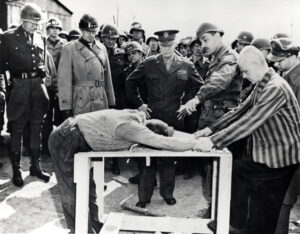The Ethics of Obedience
Theme
The Ethics of Obedience, blind obedience and organizational pressures have historically led to the commission of heinous crimes, both in military and civilian contexts. While loyalty and discipline are essential for organizational functioning, their unchecked forms can suppress moral judgment and lead individuals to participate in unethical or criminal acts. This issue poses a serious threat to human rights and ethical governance. Therefore, there is a pressing need to critically examine these dynamics and propose effective corrective measures with the broader objective of ensuring that institutional structures support both discipline and individual moral responsibility. https://mrpo.pk/redefining-hrd-for-pakistan/
Aim
The aim of this article is to investigate how organizational pressure, obedience, and loyalty contribute to the perpetration of grave crimes, to analyze the psychological and structural causes behind this phenomenon, and to suggest ethical, educational, and legal strategies to prevent such outcomes.
Scope

This article will explore historical and contemporary examples from military, political, religious, and corporate contexts where organizational obedience led to severe human rights violations or ethical breakdowns. It will analyze contributing factors such as hierarchical control, fear of punishment, indoctrination, and diffusion of responsibility. The study will remain focused on identifying the causes, impacts, and solutions related to institutional obedience and will not cover unrelated aspects of organizational behavior or leadership models.
Introduction. Heinous crimes throughout history have often been committed due to organizational pressures, blind obedience, and loyalty to institutions. While discipline and commitment are essential for the functioning of any organization, excessive compliance can lead individuals—even those otherwise known for their honesty and moral uprightness—to commit acts they might otherwise find reprehensible. When personal conscience is overridden by allegiance to organizational or national goals, ethical boundaries are blurred, and criminal behavior is rationalized. This article explores how organizational loyalty and obedience have facilitated crimes in both military and civilian spheres, highlights historical examples, identifies the core problem, and suggests remedial measures to prevent such occurrences in the future.
The Nature of Organizational Pressures, Obedience, and Loyalty. Organizational pressures arise when individuals feel compelled to conform to an institution’s expectations, even at the cost of ethical considerations. This pressure is particularly pronounced in hierarchical structures where authority figures exert significant influence. Obedience and loyalty to an organization, when unchecked, can suppress independent thought and moral judgment, leading to devastating consequences. Such tendencies have manifested in numerous historical events across military and civilian domains.

Military Examples of Heinous Crimes Due to Organizational Pressures
- The Holocaust and Nazi Germany. One of the most infamous examples of blind obedience leading to crimes against humanity is the Holocaust. Adolf Hitler’s leadership relied on the absolute loyalty of military and paramilitary organizations like the SS. Soldiers and officers followed orders without question, committing genocide against millions of Jews and other persecuted groups.1 The Nuremberg Trials exposed how individuals justified their actions by claiming they were “just following orders,” demonstrating the dangers of uncritical obedience under organizational pressure.2

- My Lai Massacre, Vietnam War. During the Vietnam War, American soldiers under Lieutenant William Calley massacred hundreds of unarmed Vietnamese civilians in My Lai in 1968. The soldiers, acting under direct orders, killed men, women, and children, driven by an organizational culture that dehumanized the enemy. The incident became a symbol of the perils of blind military obedience and institutional pressure to achieve objectives at all costs. 3

- Japanese War Crimes in World War II. The Imperial Japanese Army committed numerous atrocities, including the Nanjing Massacre (1937), where thousands of Chinese civilians and prisoners of war were brutally killed. Soldiers were indoctrinated with extreme nationalism and loyalty to the Emperor, leading them to commit inhumane acts without moral hesitation. The pressure to uphold the honor of the Imperial Army often overrode individual moral reasoning.4

Civilian and Non-Military Examples of Heinous Crimes
- Jonestown Mass Suicide (1978). The People’s Temple, led by Jim Jones, was a cult that demanded absolute loyalty from its followers. In 1978, over 900 members, including children, committed mass suicide in Guyana by drinking poison. This tragedy underscores how organizational pressure and blind devotion to a leader can lead to self-destruction.5

- Corporate Crimes: Enron Scandal. In the corporate world, blind loyalty to leadership has also led to devastating consequences. Enron executives engaged in widespread fraud, misleading shareholders and employees, resulting in financial ruin for thousands. Employees, driven by an unquestioning commitment to the organization and fear of repercussions, ignored warning signs of unethical practices. 6

- Political Regimes and Crimes Against Humanity. Authoritarian regimes such as Stalinist Russia and Maoist China relied on absolute obedience to the state, leading to mass purges, forced labor camps, and famine-related deaths. Citizens and officials alike followed directives without question, enabling large-scale human rights violations under the pressure of state ideology and organizational control.
- Modern Example: Cambridge Analytica Scandal (2018). In a more recent example, the political data firm Cambridge Analytica was found to have harvested personal data from millions of Facebook users without consent to influence elections. Employees and contractors followed instructions that compromised democratic processes, revealing how even in tech and data-driven organizations, loyalty to goals and leadership can override ethical norms.7

The Core Problem: Why Do Organizational Pressures Lead to Heinous Crimes? Several psychological, social, and structural factors contribute to this phenomenon:
Another alarming aspect of this phenomenon is that individuals who are otherwise considered morally upright and conscientious are often the ones carrying out these acts under institutional pressure. It is not only the psychologically vulnerable or ideologically extreme who fall into this pattern—ordinary citizens, employees, and soldiers have all been documented as participating in crimes when guided by a perceived sense of duty or loyalty. This complicates the issue further, showing that the problem lies more in systemic influence than individual character flaws.
- Dehumanization of the Opponent or Victim. Organizations often create an “us vs. them” mentality, making it easier for individuals to commit atrocities against perceived enemies.
- Fear of Punishment or Repercussions. Many individuals comply with unethical orders due to fear of punishment, demotion, or ostracization from their organization.
- Hierarchical Pressure and Chain of Command. In rigid hierarchies, questioning orders is discouraged, making it difficult for individuals to act according to their moral compass.
- Psychological Conditioning and Indoctrination. Military training, corporate culture, and cult-like organizations condition individuals to prioritize loyalty over morality.
- Diffusion of Responsibility. In large organizations, individuals feel less personal responsibility for their actions, believing that accountability lies with higher authorities.
- Ethical Reasoning vs. Obedience Frameworks. Many organizations foster a consequentialist mindset—focusing on results over means—while suppressing deontological ethics, which emphasize the morality of actions themselves. This imbalance weakens ethical resistance to immoral orders.
Leadership and Organizational Culture Leadership plays a pivotal role in shaping organizational behavior. Ethical leaders who foster transparency, moral debate, and decentralized decision-making can act as critical safeguards against the corrosive effects of blind obedience. Conversely, authoritarian or manipulative leadership styles exacerbate the problem by demanding unquestioning loyalty and punishing dissent.
Remedial Measures: Preventing Blind Obedience and Its Consequences
- Encouraging Ethical Decision-Making. Organizations must train individuals to balance loyalty with ethical considerations. Military institutions and corporations should incorporate ethical training into their leadership programs.
- Promoting Whistleblower Protection. Individuals should feel safe reporting unethical behavior without fear of retaliation. Laws and policies must support whistleblowers who expose wrongdoing.
- Teaching Critical Thinking and Moral Reasoning. Education systems should emphasize critical thinking, enabling individuals to question orders that contradict ethical principles.
- Decentralization of Power. Over-centralized authority structures create environments conducive to blind obedience. Encouraging decentralized decision-making can mitigate this risk.
- Historical Awareness and Lessons from the Past. Educating individuals about historical examples of crimes committed due to blind obedience can serve as a cautionary lesson.
- Accountability and Legal Safeguards. Strict legal frameworks should hold individuals accountable for crimes committed under the guise of following orders, discouraging future occurrences.
- Encouraging a Culture of Dissent and Debate. Organizations must cultivate environments where questioning authority is accepted and even encouraged when ethical concerns arise.
Conclusion. While obedience and loyalty are necessary for the smooth functioning of military and non-military organizations, unchecked organizational pressures have historically resulted in catastrophic consequences. The fact that even morally upright and law-abiding individuals have committed horrific acts under the guise of duty or loyalty underscores the severity of the issue. The key to preventing such tragedies lies in fostering ethical awareness, promoting independent thought, and creating mechanisms that encourage accountability. Societies must strive for a balance where discipline coexists with moral reasoning, ensuring that obedience does not come at the cost of humanity.


